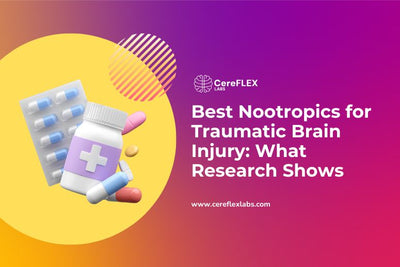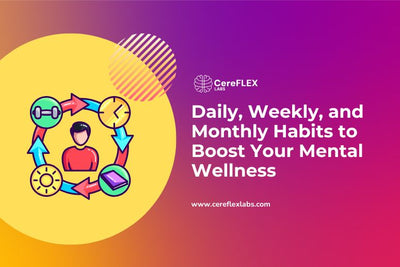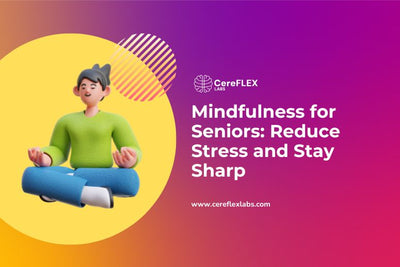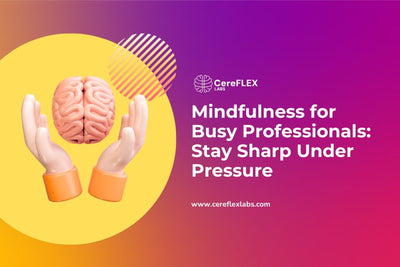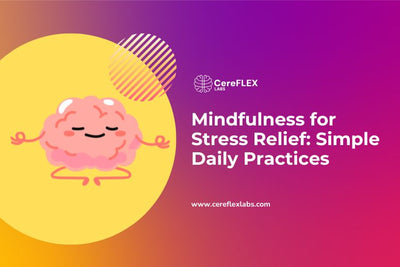Finding balance and staying positive can often be challenging. While occasional low moods are part of life, many people are turning to natural solutions instead of medications. That’s where natural nootropics step in—they offer gentle, effective ways to uplift your mood and clear your mind.
These plant-based supplements are known to support emotional health, reduce stress, and enhance focus. From time-tested herbs like Ashwagandha to modern favourites like L-Theanine, natural nootropics provide safe, non-addictive methods to improve mental well-being. But how do these cognitive enhancement supplements work, and which ones deliver the best results?
This guide will uncover the science behind mood-boosting nootropics, showcase the top natural options, and offer practical tips to incorporate them into your daily routine effectively.
Here is the Quick Answer |
|
Natural nootropics like Rhodiola Rosea, Ashwagandha, and Bacopa Monnieri support mood by balancing brain chemicals and reducing stress. These plant-based supplements enhance focus, mental clarity, and emotional well-being without harsh side effects. Start with recommended doses, consult a healthcare provider, and choose quality products for best results. |
What are natural nootropics?
Nootropics, often referred to as "smart drugs" or "cognitive enhancers," are substances that improve brain health and mental performance. They support functions such as memory, focus, creativity, and mood. Unlike stimulants that offer temporary energy boosts, nootropics enhance the brain's natural processes, promoting long-term mental well-being.
Natural vs. Synthetic Nootropics
Nootropics fall into two primary categories: natural and synthetic.
-
Natural Nootropics: Derived from plants, herbs, and other natural sources, examples include Bacopa monnieri, Rhodiola Rosea, and Omega-3 fatty acids. They are gentle on the body and carry a lower risk of side effects, making them ideal for long-term use.
-
Synthetic Nootropics: Manufactured in laboratories, these substances are designed to improve cognitive function. While they can be effective, they often carry higher risks of side effects and may not be suitable for everyone.
Natural nootropics are especially popular among health-conscious individuals seeking non-pharmaceutical ways to enhance mental well-being.
How Natural Nootropics Enhance Mood and Cognitive Function
Mood and cognitive function are deeply interconnected. A positive mood can sharpen focus, boost motivation, and enhance creativity, while a low mood may impair memory, decision-making, and productivity.
Natural nootropics work by supporting key neurotransmitters such as serotonin, dopamine, and GABA, which regulate emotions and help manage stress. By enhancing these brain chemicals, natural nootropics effectively promote mental clarity and emotional balance.
Choosing natural nootropics not only helps improve mood but also supports overall brain health. Whether you aim to reduce stress, boost energy, or foster calmness, these supplements provide a safe, holistic approach to achieving mental well-being.
What are the best natural nootropics for mood enhancement?
Discover some of the most effective natural nootropics that can enhance your mood, reduce stress, and improve mental clarity. These plant-based supplements work harmoniously with your body to promote emotional well-being and optimal brain function. Below are the top choices for mood enhancement:

1- Rhodiola Rosea
Rhodiola Rosea is an herb native to the Arctic and mountainous regions of Europe, Asia, and North America. For centuries, it has been a staple in traditional medicine, valued for its ability to help the body adapt to stress and enhance cognitive function.
Research and Benefits
Scientific studies reveal that Rhodiola Rosea can improve mood, alleviate stress, and maintain alertness. As a potent adaptogen, it helps the body stay balanced under pressure. It’s particularly effective for reducing fatigue and easing anxiety, making it an excellent choice for individuals experiencing stress-related low moods.
Mechanism of Action
Rhodiola Rosea reduces mental fatigue by boosting key neurotransmitters, including serotonin, norepinephrine, and dopamine. These brain chemicals play a critical role in mood regulation, stress response, and overall mental clarity.
2- Ashwagandha
Ashwagandha is a revered herb in Ayurvedic medicine, renowned for its ability to help the body manage stress while enhancing mental clarity without causing drowsiness. With its potent stress-reducing properties, Ashwagandha is often regarded as one of the most effective nootropics that help confidence and anxiety.
Research and Benefits
Studies suggest that Ashwagandha can significantly reduce anxiety, particularly for individuals dealing with chronic stress or anxiety disorders. However, its effects may be less pronounced for general anxiety unrelated to stress.
While more research is needed to determine optimal dosages, existing evidence highlights its role in promoting emotional balance and making everyday stress easier to manage.
Mechanism of Action
Ashwagandha reduces levels of cortisol, the stress hormone, and supports the brain's structure and function by rebuilding axons, dendrites, and synapses. It enhances the efficiency of GABA receptors and regulates serotonin levels, allowing GABA to connect more effectively with neuron receptors. These mechanisms collectively foster a calm and focused state of mind.
3- Bacopa Monnieri
Bacopa monnieri is a prominent herb in Ayurvedic medicine, widely recognised for its ability to enhance brain chemicals that support thinking, learning, and memory. It is a staple ingredient in many nootropic blends, prized for its strong memory-boosting properties.
Research and Benefits
Research shows that Bacopa monnieri may reduce anxiety in older adults by acting as a mild modulator rather than a potent treatment. Additionally, a study found that adults who used Bacopa experienced lower levels of anxiety and depression compared to those who took a placebo.
Bacopa monnieri offers numerous benefits, including stress reduction, cognitive enhancement, and mood improvement. It promotes mental clarity, emotional balance, and memory retention, making it an excellent choice for individuals seeking a calm and focused state of mind.
Mechanism of Action
Bacopa monnieri enhances cognitive function by boosting acetylcholine, a neurotransmitter crucial for memory and learning. It reduces oxidative stress, protects nerve cells, and prevents the accumulation of β-amyloid, which is linked to cognitive decline. Additionally, it supports mitochondrial function, encourages dendrite growth, and positively influences mood and memory by modulating GABA and serotonin levels.
4- Ginseng
Ginseng has been a cornerstone of traditional Chinese medicine for centuries, valued for its ability to enhance overall health and well-being. Modern research suggests that ginseng can improve brain functions such as mood, behaviour, and memory.
Research and Benefits
Studies on animals and laboratory research highlight that ginseng’s mood-enhancing effects may stem from its ability to boost dopamine levels in the brain. This dopamine regulation can positively impact mental health, including cognitive function, attention, and emotional well-being.
Additionally, ginsenosides, active compounds found in ginseng, play a significant role in these benefits.
Ginseng is known to reduce stress, combat fatigue, and enhance mood. It boosts energy, focus, and brain performance, making it easier to manage emotional and mental stress. Its adaptogenic qualities promote resilience and overall health.
Mechanism of Action
Ginseng, a member of the Araliaceae family, contains ginsenosides that act as adaptogens to protect the body against stress and maintain homeostasis. Its active components—saponins, phenolic compounds, and polysaccharides—exhibit antioxidative and anticancer properties. These mechanisms collectively enhance mental clarity, emotional stability, and cognitive function.

5- Ginkgo Biloba
Ginkgo Biloba is a plant native to China, traditionally used for centuries to address various health issues. While research on ginkgo supplements offers mixed results, some studies indicate that it can improve mental performance, brain function, and mood.
Research and Benefits
Animal studies suggest that long-term ginkgo supplementation may raise dopamine levels, leading to improved cognitive function, memory, and motivation.
These findings highlight its potential as a natural tool for enhancing both mental clarity and emotional well-being.
Ginkgo Biloba supports cognitive health by improving blood circulation to the brain, boosting memory and focus, and reducing anxiety. Additionally, it helps protect against oxidative stress, promoting overall mental and emotional balance.
Mechanism of Action
Ginkgo Biloba enhances brain function through its antioxidant properties, nerve protection, and ability to improve blood flow. Its active compounds reduce oxidative stress and amyloid-β damage, improve neurotransmission by increasing levels of serotonin, dopamine, and norepinephrine, and enhance cholinergic activity.
By widening blood vessels and increasing cerebral blood flow, ginkgo supports memory, cognition, and overall brain health while reducing platelet clumping.
Recommended Dosages
To maximise the benefits of nootropics while ensuring safety, follow these general dosage guidelines:
-
Rhodiola Rosea: Adults typically take 100–600 mg daily for up to 12 weeks.
-
Ashwagandha: A dose of 300 mg, taken 2–3 times daily, is commonly used to lower cortisol levels and support restful sleep.
-
Bacopa Monnieri: 300–600 mg daily, best consumed with food to enhance absorption. Consistent use for 6–12 weeks is recommended for noticeable effects.
-
Ginseng: Doses usually range from 200 mg to 3 grams daily for up to 12 weeks.
Ginkgo Biloba: Most adults use 60–240 mg daily for up to 6 months.
Important Note: Before using nootropics, consult a healthcare provider, especially if you:
- Take medications that might interact with nootropics.
- Have existing health conditions, such as heart problems or autoimmune disorders.
- Are pregnant, nursing, or planning to become pregnant.
- Need guidance on dosage or managing potential side effects.
A healthcare professional can provide personalised advice to help you use nootropics safely and effectively.
Common Side Effects
While natural nootropics are generally well-tolerated, some individuals may experience mild to moderate side effects. Here’s an overview of potential side effects associated with the most common mood-enhancing nootropics:
-
Rhodiola Rosea: May cause dizziness, dry mouth, or excessive saliva.
-
Ashwagandha: High doses can lead to stomach upset, diarrhea, or vomiting. Rarely, liver issues have been reported.
-
Bacopa Monnieri: Common side effects include stomach cramps, nausea, and dry mouth.
-
Ginseng: May cause difficulty sleeping. In rare cases, it can trigger severe rash, liver damage, or serious allergic reactions.
-
Ginkgo Biloba: Mild side effects include stomach upset, headaches, dizziness, and skin allergies. It may also increase the risk of bruising and bleeding or cause irregular heartbeats.
Important Reminder: If you experience severe or persistent side effects, discontinue use and consult a healthcare provider. Always start with a low dose and monitor your body’s response to ensure safe supplementation.

Tips for Safe Supplementation
Incorporating nootropics into your routine requires thoughtful planning to ensure both safety and effectiveness. Follow these tips to maximise benefits while minimising potential risks:
Start Low and Go Slow: Begin with the smallest recommended dose and gradually increase it, observing how your body responds.
Check for Overlap in Ingredients: When using multiple nootropics, review the ingredient lists carefully to avoid exceeding safe limits for any substance.
Be Consistent: Use nootropics regularly and as directed to achieve optimal results. Avoid sporadic use or consuming large doses.
Prioritise Quality: Select high-quality supplements with transparent ingredient lists and reputable safety certifications.
Consult a Healthcare Provider: Seek professional advice before starting any new supplement, especially if you:
- Take medications that may interact with nootropics.
- Have existing health conditions.
- Are pregnant, breastfeeding, or planning to conceive.
By following these guidelines, you can safely integrate nootropics into your routine and enjoy their full range of benefits.
Why Choose Cereflex Labs for Mood-Enhancing Nootropics
CereFLEX Labs offers innovative AM/PM brain formulas designed to support cognitive function, memory, peripheral circulation, and protect cells from oxidative damage caused by free radicals throughout the day and night.
These formulas are crafted with safe, science-backed ingredients to ensure comprehensive brain health and emotional balance. By choosing Cereflex Labs, you gain access to high-quality products created to improve mental wellness with ease and effectiveness, backed by trusted expertise.
Conclusion
Natural nootropics offer a reliable and effective way to enhance mood, reduce stress, and support overall brain health. With ingredients like Bacopa monnieri, Rhodiola Rosea, and Ashwagandha, these supplements can help you achieve emotional balance, improve mental clarity, and promote long-term cognitive wellness.
Ready to experience the benefits of natural nootropics? Explore CereFLEX Labs’ AM/PM Brain Formulas today.

